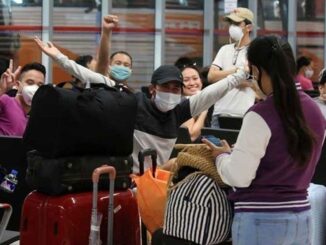
MANILA, Philippines — Thirteen Filipinas convicted in Cambodia for acting as surrogate mothers arrived at the Ninoy Aquino International Airport yesterday and will have a place to stay, courtesy of the Department of Social Welfare and Development.
DSWD Secretary Rex Gatchalian vowed to give the 13 the assistance they need, through the Recovery and Reintegration Program for Trafficked Persons (RRPTP), following their conviction for surrogacy, which is illegal in Cambodia.
The Inter-Agency Council Against Trafficking (IACAT), which is under the Department of Justice (DOJ), assisted in the repatriation efforts.
“The DSWD, as the co-chairperson of the Inter-Agency Council Against Trafficking, treats the 13 surrogate mothers as victims of trafficking, and all forms of assistance should be given to them, including the provision of transportation and temporary shelter in one of the DSWD’s center and residential care facilities (CRCFs),” Assistant Sec. Irene Dumlao, DSWD spokesperson, said.
“Indeed, this is the best way to end the year, by delivering real justice for all in real time,” Justice Secretary Jesus Crispin Remulla said.
The Department of Foreign Affairs (DFA) said the women received a royal pardon from His Majesty Preah Bat Samdech Preah Boromneath Norodom Sihamoni on Dec. 26, following a request from the Philippine embassy in Phnom Penh and the endorsement of the Cambodian government.
“Upon the request of the Philippine embassy and with the endorsement of the Royal Government of Cambodia, the Royal Decree pardoning all 13 Filipinos paved the way for their immediate repatriation,” the DFA said in a statement.
Aside from the mothers, three babies were also repatriated, all of whom arrived at the NAIA Terminal 1 via Philippine Airlines, accompanied by a Cambodian doctor and a Filipino nurse.
Elaine Fallarcuna, assistant secretary for international affairs, attached and supervised agencies, who represents the DSWD in the IACAT, reported to Gatchalian last Dec. 27 that a CRCF is already being prepared as temporary shelter for the 13 mothers and three babies.
“While the surrogate mothers are in temporary shelter, the DSWD will help them communicate with their families for their reintegration. The respective families of the surrogate mothers will also be assessed for the provision of the necessary services and intervention,” Fallarcuna said.
She also said two passenger vans – from the DSWD’s Field Office-National Capital Region and the Central Office – are ready to transport the trafficked women and their babies to the agency-managed CRCF in Metro Manila.
“Transportation assistance back to their respective cities and provinces will also be provided. Other needed intervention such as counseling services will be provided during assessment by the assigned social worker in the CRCF,” Fallarcuna said.
The Filipina mothers were among the 24 foreign women caught by Cambodian police in Kandal province in September and charged with attempted cross-border human trafficking.
The Cambodian court had said the 13 Filipinas “have the intention… to have babies to sell to a third person in exchange for money, which is an act of human trafficking.”
The mothers were tried and convicted under Cambodia’s 2008 Law on the Suppression of Human Trafficking and Sexual Exploitation for participating in a surrogacy scheme, and sentenced to four years in jail.
Efforts by the DOJ and IACAT in initiating dialogues with the Cambodian government led to the penalty being reduced to two years in jail, before finally being given the royal pardon last week.
The DFA thanked Cambodia for the humanitarian treatment extended to the women during the investigation and judicial processes.
“Their safe return highlights the strong diplomatic ties between the Philippines and Cambodia, as well as both countries’ shared commitment to combat human trafficking and transnational crime,” the DFA said.
The DFA reminded Filipinos that surrogacy is prohibited in Cambodia.
The Philippine government has taken the position that the Filipinas involved in the surrogacy scheme were trafficking victims. There is no law prohibiting or allowing surrogacy in the Philippines, providing a legal gray area prone to abuse.
The DOJ and the IACAT urged Filipinos to be cautious of job offers that may seem too good to be true as this could lead to exploitation. — Artemio Dumlao, Pia Lee-Brago, Daphne Galvez





Be the first to comment